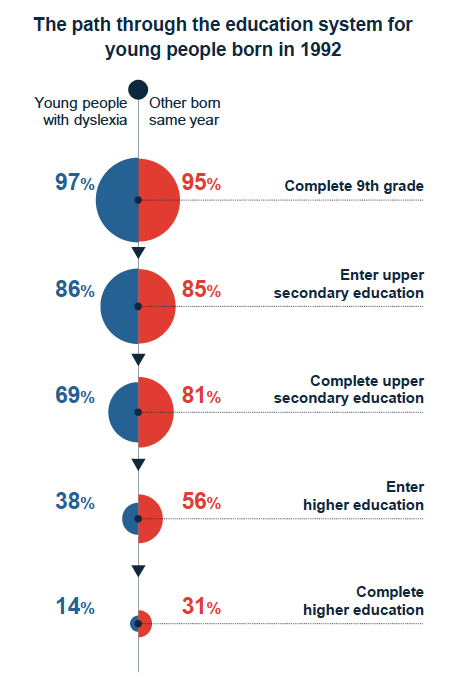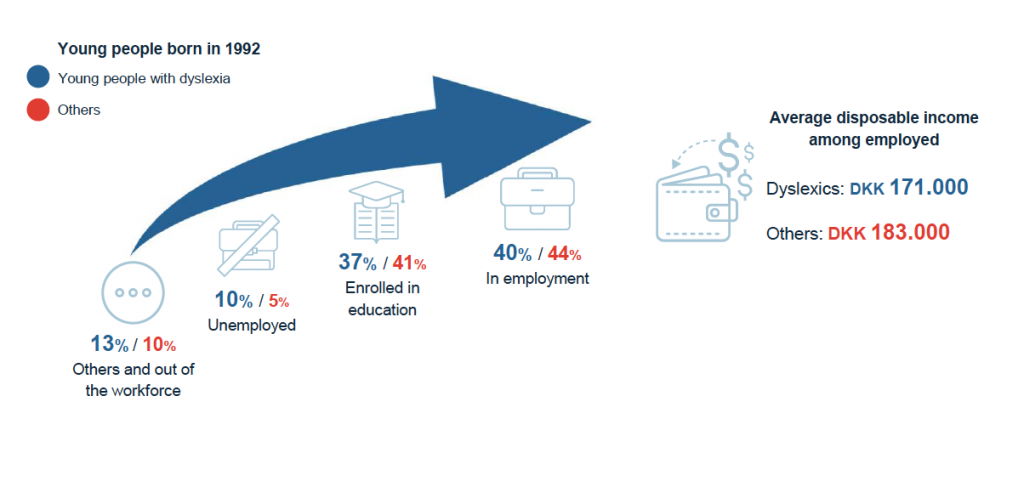
Insights are required to give young people with dyslexia equal opportunities in the education system
The Egmont Foundation works to safeguard children and young people against “modern poverty” – the lack of learning and life skills. Every year the Egmont Foundation invests approx. DKK 100M with their main objective, that by 2030 all young people are able to complete an upper secondary education.
In 2018, the Egmont Foundation carried out a study focusing on dyslexia among children and young people in Denmark. The aim was to collect insights that could help improve learning and vitality among dyslectics. Previous studies have shown that fewer young people with dyslexia finish an upper secondary education compared to others.
To be able to optimise education for dyslectics, it was necessary to identify challenges of these young people’s school life. More specifically, to understand:
1) education patterns and expectations
2) performance in primary school
3) experienced support
4) use of digital aids
5) the importance of wellbeing at schools, and
6) the importance of social background.
Epinion was chosen to conduct the research. Epinion is a market research agency headquartered in Denmark who empower organisations to improve today and see tomorrow.
A design with survey and register data to maximise the validity of the study
Egmont Foundation chose a solid design using survey and register data to map the challenges among children and young people in Denmark with dyslexia. The two methods were combined to gain a full understanding of ways to improve learning for dyslectics. In both methods, Epinion created a control group for comparison.
Nota, the Danish Library and Expertise Centre for people with print disabilities, has a very large member database of dyslectic children and young people constituting the population. For the survey, a representative group of the population aged 14 to 22 years old was invited, and 1.024 participated. The control group was constituted of 204 randomly selected young people in the same age.
For the register analysis, Nota’s member data was enriched with data from Statistic Denmark adding information about education pattern, grades, family background, income and much more. Only young people aged 25 with dyslexia constituted the population here, because 25 is an important cutting point in the Danish education and employment systems. They were compared to all other young people born in the same year using statistical matching techniques.

The results are now the basis for prioritising efforts and funding on the most pressing issues
Through the study, Egmont Foundation has gained a new understanding of both the wellbeing of dyslectic children and young people in the educational system, and characteristics of dyslectic when it comes to educational level, grades, employment, and much more.
The study showed that dyslectic children and young people, today, don’t have the same opportunities to complete a secondary education as others. The study finds that, while an equal number of dyslectics enter a secondary education, fewer dyslectics completes a secondary education compared to the control group. One of the possible influencing factors could be that dyslectic children and young people earn lower grades in primary school, especially in Danish and English, but also in math.
This is important and highly relevant knowledge for both political actors and NGO’s engaged in creating the best opportunities for the education of all children and young people, despite their social background. We know that education is a significant factor in protecting children and young people with dyslexia against further vulnerability, and the study has already increased the awareness of the problem in the Danish municipalities.
The results of the study provide Egmont Foundation with a basis for prioritising which issues are the most urgent to address when it comes to the wellbeing of dyslectic young people, and which charity projects are the most relevant to fund.

Based on the study, Egmont Foundation formulated three objectives for future efforts:
· To detect every dyslectic, as early as possible
· To minimise differences in primary school grades between dyslectic and other children
· To minimise the effect of social background on the possibilities for dyslectics to complete a secondary education
To be able to achieve these objectives, it is essential that institutions and organizations involved in the sector work together and engage in broad ranging partnerships. Egmont Foundation has decided to invest a minimum of DKK 20M in the coming years to accomplish the objectives and is currently looking for specific projects with solutions to the three objectives to fund
